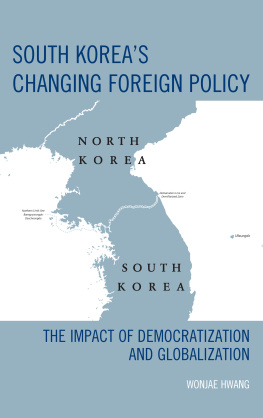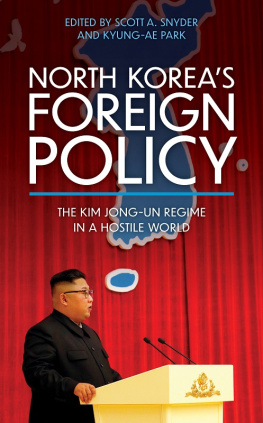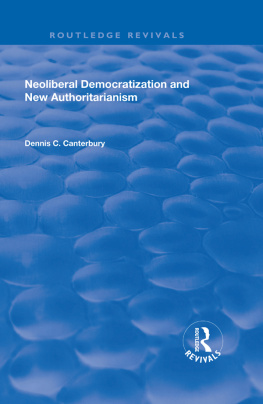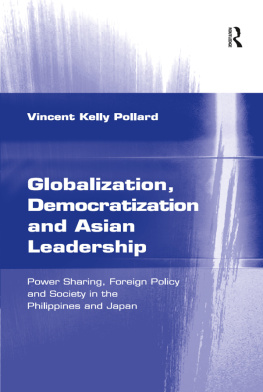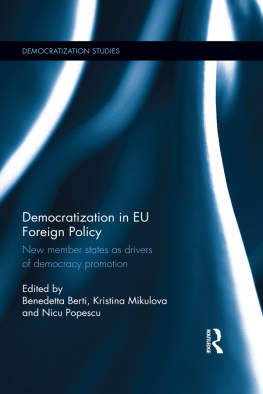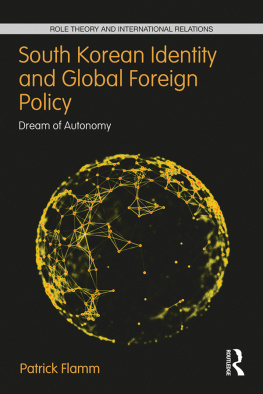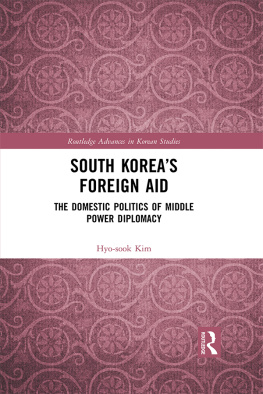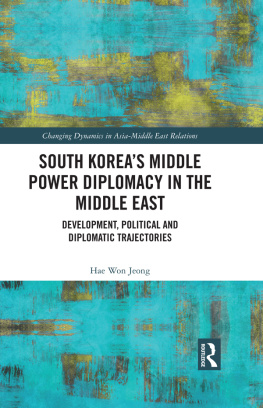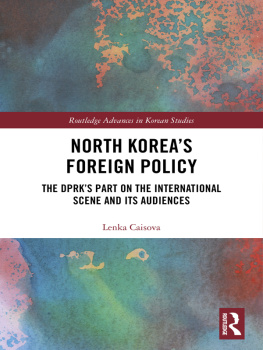Hwang - South Koreas changing foreign policy: the impact of democratization and globalization
Here you can read online Hwang - South Koreas changing foreign policy: the impact of democratization and globalization full text of the book (entire story) in english for free. Download pdf and epub, get meaning, cover and reviews about this ebook. City: Südkorea, year: 2017;2012, publisher: Lexington Books, a division of Rowman & Littlefield Publishers, Inc., genre: Politics. Description of the work, (preface) as well as reviews are available. Best literature library LitArk.com created for fans of good reading and offers a wide selection of genres:
Romance novel
Science fiction
Adventure
Detective
Science
History
Home and family
Prose
Art
Politics
Computer
Non-fiction
Religion
Business
Children
Humor
Choose a favorite category and find really read worthwhile books. Enjoy immersion in the world of imagination, feel the emotions of the characters or learn something new for yourself, make an fascinating discovery.
South Koreas changing foreign policy: the impact of democratization and globalization: summary, description and annotation
We offer to read an annotation, description, summary or preface (depends on what the author of the book "South Koreas changing foreign policy: the impact of democratization and globalization" wrote himself). If you haven't found the necessary information about the book — write in the comments, we will try to find it.
South Koreas changing foreign policy: the impact of democratization and globalization — read online for free the complete book (whole text) full work
Below is the text of the book, divided by pages. System saving the place of the last page read, allows you to conveniently read the book "South Koreas changing foreign policy: the impact of democratization and globalization" online for free, without having to search again every time where you left off. Put a bookmark, and you can go to the page where you finished reading at any time.
Font size:
Interval:
Bookmark:
South Koreas
Changing Foreign Policy
South Koreas
Changing Foreign Policy
The Impact of
Democratization and Globalization
Wonjae Hwang
LEXINGTON BOOKS
Lanham Boulder New York London
Published by Lexington Books
An imprint of The Rowman & Littlefield Publishing Group, Inc.
4501 Forbes Boulevard, Suite 200, Lanham, Maryland 20706
www.rowman.com
Unit A, Whitacre Mews, 26-34 Stannary Street, London SE11 4AB
Copyright 2017 by Lexington Books
All rights reserved. No part of this book may be reproduced in any form or by any electronic or mechanical means, including information storage and retrieval systems, without written permission from the publisher, except by a reviewer who may quote passages in a review.
British Library Cataloguing in Publication Information Available
Library of Congress Cataloging-in-Publication Data Available
ISBN 978-1-4985-3184-9 (cloth : alk. paper)
ISBN 978-1-4985-3185-6 (electronic)
 TM The paper used in this publication meets the minimum requirements of American National Standard for Information Sciences Permanence of Paper for Printed Library Materials, ANSI/NISO Z39.48-1992.
TM The paper used in this publication meets the minimum requirements of American National Standard for Information Sciences Permanence of Paper for Printed Library Materials, ANSI/NISO Z39.48-1992.
Printed in the United States of America
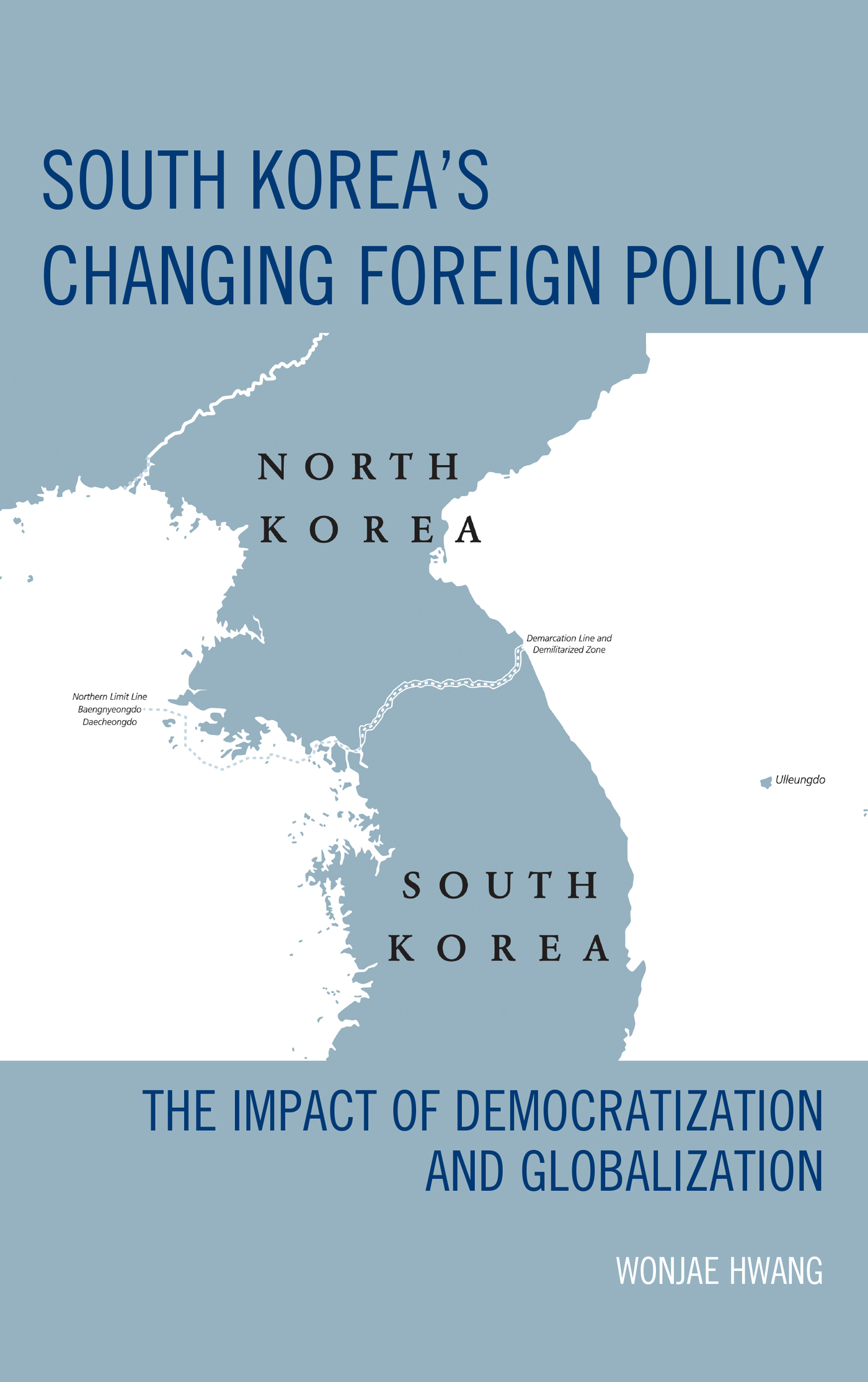
4.1 | Koreas Major Trade Partners (19792014) |
6.1 | Bilateral Trade Context and Labor Rights Laws in Korea |
6.2 | Bilateral Trade Context and Labor Rights Practices in Korea |
7.1 | Vote Congruence Rate (%) in the UNGA (19912012) |
8.1 | States Ideal Point Estimates (19912014) |
5.1 | Koreas decision of ODA disbursement |
6.1 | Trade, FDI, and Labor Laws, 19852002 |
6.2 | Trade, FDI, and Labor Laws, 19852002 (OECD and Non-OECD) |
8.1 | The United States, Economic Integration, Shared Security Concerns, and Korea-Japan Vote Congruence (Yes or No: 19912012) |
9.1 | ODA, Trade, and Foreign Policy Convergence with South Korea |
This book is dedicated to my beloved parents, wife, Soonjoo, and three children, Chanhee, Sehee, and Joonhee. I would like to give special thanks to Uk Heo, Randy Willemain, Matt Buehler, Ian Down, colleagues in the department of political science at the University of Tennessee, and the editorial team at Lexington Books, Emily Roderick, Katherine Ha, and Joseph Parry, for their strong help and support. This work was supported by the Academy of Korean Studies grant funded by the Korean Government (MEST) (AKS-2012-AAZ-2101).
Democratization, Globalization, and Foreign Policies
Democratization and globalization are the two most important terms that define modern Korean politics, both domestic and international. As such, a great many scholars have examined the background, causes, processes, and consequences of democratization and globalization in South Korea. Nevertheless, not much has been done to analyze the impact of these two factors on Koreas foreign policies. This is what this book will undertake. This book suggests understanding changes in Koreas foreign policy as a consequence of the interplay between domestic and international politics. Accordingly, I examine how democratization and economic globalization have changed the terrain of Korean domestic politics and consequently reshaped Koreas foreign policies.
South Koreas foreign policies have been dynamically transformed in the twenty-first century. First of all, as the dominant features that shape Asian regional politics and order have shifted from economic nationalism and security bilateralism to economic interdependence and security multilateralism (Acharya 2014), so South Koreas foreign policy positions toward neighboring countries have also become multifaceted. For instance, South Korea has traditionally maintained close ties with the United States especially in regard to security concerns. However, the South Korean government has recently taken its relationship with China seriously for mainly economic reasons. It seems that material concerns are playing a more important role in the foreign policy decision-making process. Here, both theoretically and practically, the important question is whether or not increasing economic integration between South Korea and China promotes foreign policy cooperation and whether it comes, if at all, at the expense of South KoreaUS relations. In particular, since China has increasingly taken opposite positions to the United States on diverse policy issues, it is important to understand how South Korea, a long-time, strong ally of the United States, is negotiating its position between the two big powers.
The rise of nationalist sentiment has also significantly influenced Koreas foreign policies. For many South Koreans, North Korea is not now viewed as an evil state to get rid of but as a rogue state to deal with. Accordingly, military crises with North Korea are perceived by South Koreans as being less serious than in the past. Instead, blame and criticism are often directed toward South Koreas political leaders for their incompetency in preventing or managing such crises. As a consequence, the rally-round-the-flag effects, which were observed in South Korean society prior to its democratic transition, have largely ceased to exist in recent decades. While wounds and the memory of the Korean War are still lingering in the hearts of many Koreans, efforts to build a positive relationship with North Korea out of humanitarian or nationalistic sentiments have also been made.
Similarly, but in the opposite direction, nationalism plays a role in foreign policies toward Japan. Despite the growing necessity of policy cooperation between South Korea and Japan with respect to North Koreas nuclear programs or regional peace and stability, historical legacies and issues strain their relationship, if not necessarily making it worse. Confrontation over historical issues such as territorial disputes over the Dokdo (Takesima) Island and comfort women significantly and negatively affects their diplomatic and political relations.
Another important aspect of South Koreas foreign policy is that it has expanded its focus beyond Northeast Asia. By diversifying trade partners and increasing investment into many regions of the world, Korea has reached out to countries in Africa, Middle East, and Latin America which were not traditionally important to the Korean economy or foreign relations. Moreover, by raising the foreign aid contribution to developing countries, Korea has become an increasingly global player, economically and politically. Here, an important question is whether Koreas growing economic ties and foreign aid contribute to increasing political influence on its trade partners and aid recipients to elicit foreign policy cooperation.
Democratization in South Korea has revitalized its civil society. Before the regime transitioned to a democracy in the late 1980s, civil society had long been suppressed and constrained by the government. The authoritarian regimes repression was benefited by a number of factors, in particular, US support for the regime, a business-centric economic drive, tensions with North Korea, and other external conditions such as the Cold War that froze the free flow of information and open discourse. Even in the relationship between the government and the market, the commanding heights were occupied by the government broadly and the minister of finance specifically.
Next pageFont size:
Interval:
Bookmark:
Similar books «South Koreas changing foreign policy: the impact of democratization and globalization»
Look at similar books to South Koreas changing foreign policy: the impact of democratization and globalization. We have selected literature similar in name and meaning in the hope of providing readers with more options to find new, interesting, not yet read works.
Discussion, reviews of the book South Koreas changing foreign policy: the impact of democratization and globalization and just readers' own opinions. Leave your comments, write what you think about the work, its meaning or the main characters. Specify what exactly you liked and what you didn't like, and why you think so.

